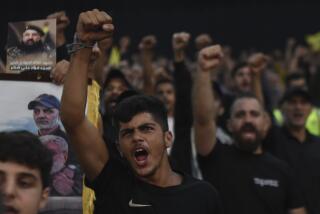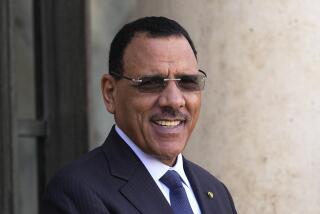Assassination Leaves Algeria in Confusion : Transition: Ruling council is uncertain about who was behind the killing and divided over who should replace Mohammed Boudiaf.
- Share via
ALGIERS — The assassination of Algerian leader Mohammed Boudiaf left this capital city numb and confused Tuesday as the crippled regime appeared uncertain about who was behind the killing and divided about whom to name as his replacement.
Boudiaf, the 73-year-old hero of the Algerian revolution called back to lead the country in January after 28 years in exile, was killed by close-range automatic-weapon fire while he was addressing a rally in Annaba, 300 miles east of Algiers, on Monday.
Most shops and businesses remained open Tuesday, and there were no visible signs of increased security. As seven days of official mourning began, flags flew at half-staff and the government announced that the July 5 celebration to mark Algeria’s independence from France 30 years ago had been canceled.
A Western diplomat based here described Algiers as “subdued and reflective” in the wake of the country’s first assassination of a national leader. Funeral rites for Boudiaf, who was president of the nation’s ruling council, are scheduled for today in El Alia cemetery outside Algiers.
“He was a man who was neither greatly loved nor greatly hated,” commented one Western diplomat. “He was in power only a few months in a bad situation that nobody blamed him for creating. Most people felt he was well-intentioned.”
Opposition parties generally condemned the killing, calling for national reconciliation and general elections that would include the country’s religious movements.
The most surprising development was the broad range of speculation about who was responsible for Boudiaf’s murder.
Early dispatches from the official government news agency reported that the assassination was conducted by one man wearing a military or police uniform. However, reporters who attended the rally said Tuesday that two men were involved in the killing, one of whom may have been killed by Boudiaf’s security staff.
In its only public announcement in the case, the governing Algerian Council of State said that one man was in custody and that it had created a commission of inquiry into the assassination.
The four remaining members of the state council and members of the Algerian national security council reportedly met continuously Tuesday to map out a plan of succession for Boudiaf, who served only 171 days after the forced resignation of former President Chadli Bendjedid in a bloodless coup Jan. 11.
The man most often mentioned to replace Boudiaf was Gen. Khaled Nezzar, the defense minister. Nezzar has long been considered the behind-the-scenes power in the regime.
The other three members of the state council are not considered serious contenders.
Other potential leaders include the senior commanders of the army, navy and air force and, to a lesser degree, the prime minister, Sid Ahmed Ghozali.
Initial speculation was that the assassination had been organized by underground members of the National Islamic Front, the powerful fundamentalist political movement banned by the regime. Last December, after the Islamic front won the first round of parliamentary elections, the military ordered fundamentalist leaders jailed and thousands of their followers sent to desert prison camps.
Monday’s killing coincided with the beginning of a controversial government trial of the two main leaders of the National Islamic Front: Abassi Madani, 61, and Ali Belhaj, 35. The trial has since been postponed until July 12.
The standoff between the fundamentalists and vestiges of the old revolutionary-era government party, the National Liberation Front, has been the major theme of Algerian politics for several years.
However, government silence about the assassination Tuesday fueled dozens of theories in the lively Algerian press about dark forces behind the killing.
According to one commonly repeated plot line, Boudiaf, who had been invited back into the country as a figure of reconciliation, untainted by association with the unpopular and corrupt National Liberation Front, had developed personal political ambitions disturbing to the power elite.
Boudiaf was assassinated while making only his second trip outside the capital since being installed as head of the state council. But the theme of his speech Tuesday was an appeal to join what he called the National Patriotic Rally, a movement that many felt had all the trappings of a political party in the making, with Boudiaf at its head.
Boudiaf is also said to have angered some members of the elite by approving the indictment of a former army general, Mostepha Beloucif, earlier this year on charges of misuse of public funds. Government corruption is widely acknowledged here.
In Washington, Bush Administration sources said that although the assassins may not be Islamists, the Algerian government is expected to eventually blame the Islamic front and its supporters. “It would serve the government’s purposes to implicate an Islamist,” said a government expert.
Private specialists agreed. “I don’t think FIS (the Islamic front) was linked to the assassination,” said John Entelis, a Fordham University North African expert and frequent visitor to Algeria. “FIS has never been a centralized, coherent political party. It’s been a movement of different Islamic tendencies. It doesn’t have the capacity to influence and dictate to all those who might be sympathetic to their cause.”
Times staff writer Robin Wright in Washington contributed to this article.
More to Read
Sign up for Essential California
The most important California stories and recommendations in your inbox every morning.
You may occasionally receive promotional content from the Los Angeles Times.












